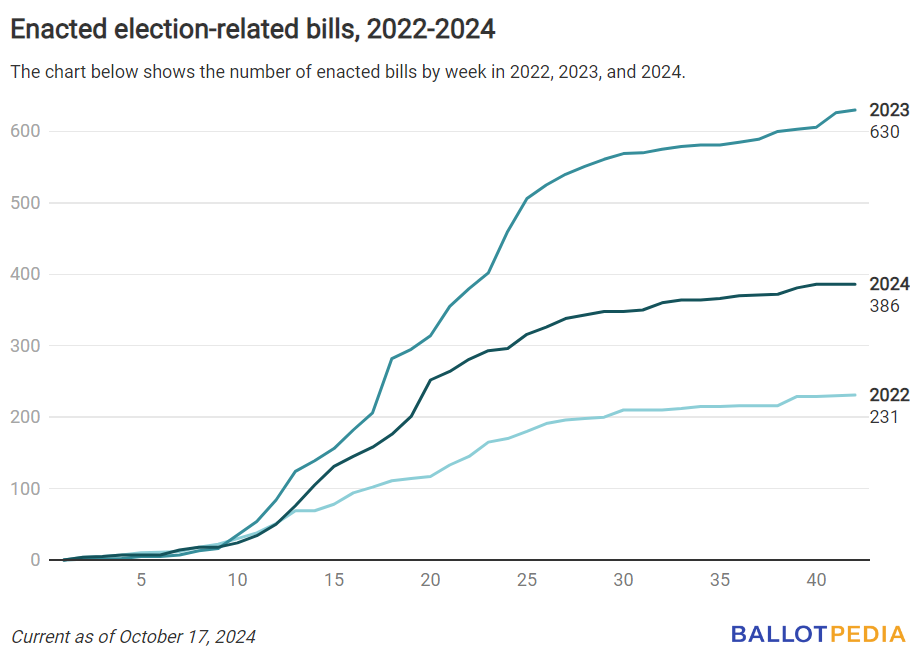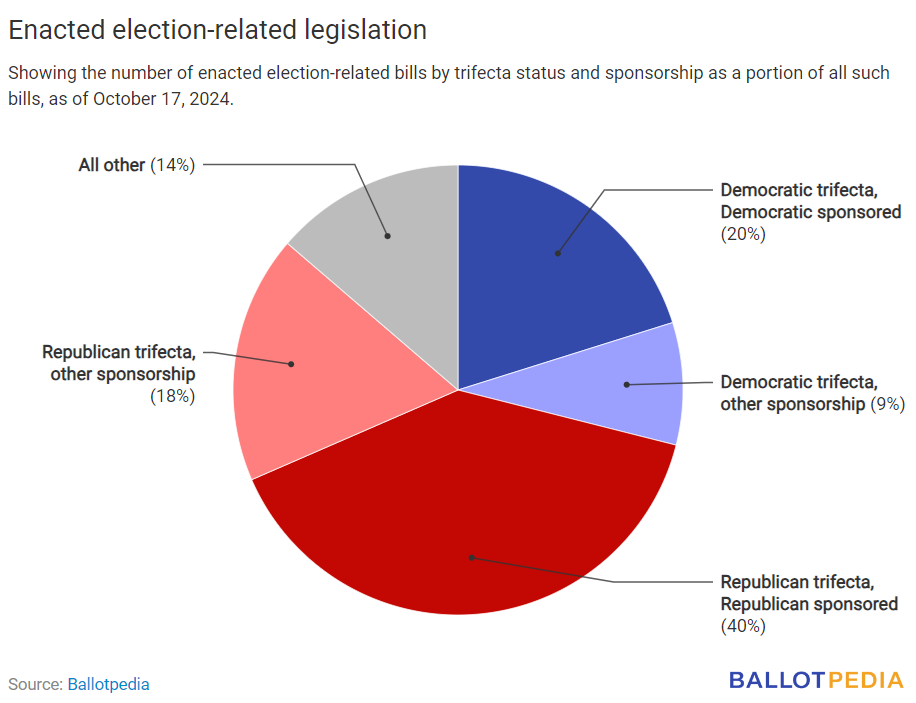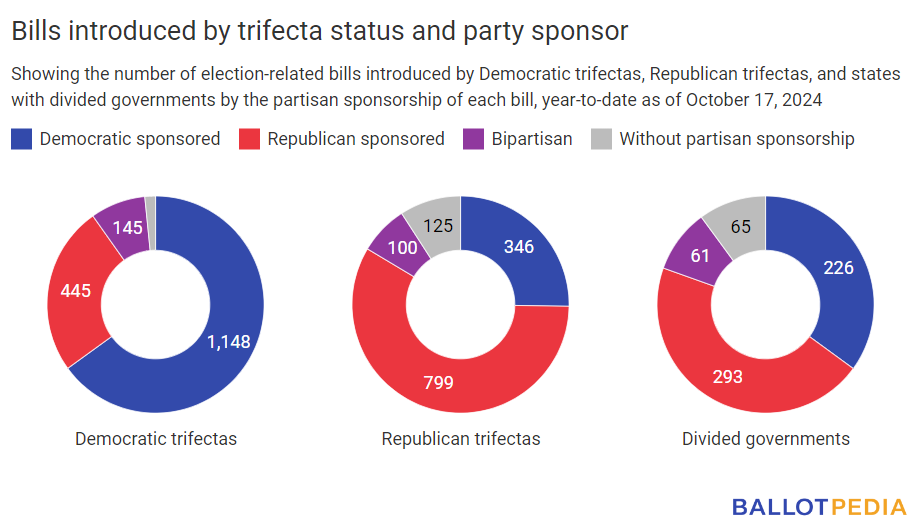It looks like you're using an Ad Blocker.
Please white-list or disable AboveTopSecret.com in your ad-blocking tool.
Thank you.
Some features of ATS will be disabled while you continue to use an ad-blocker.
share:
originally posted by: putnam6
originally posted by: IndieA
a reply to: putnam6
We didn't have algorithms in 2020? #1 and #2 we are getting huge early voting and mail ins.
Algorithms showing an unexpected and huge margin of victory this election?
Yeah but doesn't a larger margin usually mean it's easier to call an election?
Well, not if the Dems have to go find several more boxes than they prepared to make it just over the amount needed to steal the elections of any candidate they need to steal.
Amazing how when it was more simple paper ballots and mechanical voting machines the country was able to run elections efficiently and now with all
the digitial 'improvements' it takes many days to count.
There is no rational explanation for this other than the people counting want to see the results and manipulate them before the public gets to see the 'result'.
Republicans should already be pushing the SC on this, but they are once again behind the 8 ball as the Democrats set up their fraud operation.
There is no rational explanation for this other than the people counting want to see the results and manipulate them before the public gets to see the 'result'.
Republicans should already be pushing the SC on this, but they are once again behind the 8 ball as the Democrats set up their fraud operation.
edit on 22-10-2024 by UKTruth because: (no reason given)
Simpler to hide incompetent or worse if you don’t have transparency and don’t show a running tally through the counting process.
So much easier to say….. wait for it. Boom! Here’s the magic number.
So much easier to say….. wait for it. Boom! Here’s the magic number.
edit on 22-10-2024 by Lazy88 because: (no reason given)
Well of course not.
At least in MI, we need another 4 am switcharoo.
Why else would they make it illegal to question the election results?
At least in MI, we need another 4 am switcharoo.
Why else would they make it illegal to question the election results?
originally posted by: chiefsmom
Well of course not.
At least in MI, we need another 4 am switcharoo.
Why else would they make it illegal to question the election results?
Sheriff should say, "not illegal to question an election, but it is to violate the laws of the state used to make sure the ballot boxes are true".
Why did I get such a sinking feeling reading that? I’m sure it’s just to make sure the we have “the most secure election ever in history.”
You know….that democracy stuff they’re always talking about.🙄
Guess what. There's no way to verify if "overseas" ballots are actually from "voters" from any specific State!!
They must have plans to re-route "Ballots for Kamala" to States that need them. Applying for "overseas" ballots is where the fake BS is. Counterfeits! ☠️
They must have plans to re-route "Ballots for Kamala" to States that need them. Applying for "overseas" ballots is where the fake BS is. Counterfeits! ☠️
If you don't have the total within 48 hours then the votes of the entire state should be tossed and its electoral college votes removed from the total
in play.
I don't care who wins as a result of such a policy it's a total #ing joke for them to take so long.
I don't care who wins as a result of such a policy it's a total #ing joke for them to take so long.
a reply to: putnam6
No surprise really. They do a "count" then order in the boxes of "extra" ballots to adjust the "count" to reflect the winner they want.
My "guess" is that even on the day AFTER election night, many States total counts won't be in. On that day, Trump will be leading. By the end of the week, he'll be losing........by the end of the Month, Kamala will be declared the winner.
This isn't a new formula.
No surprise really. They do a "count" then order in the boxes of "extra" ballots to adjust the "count" to reflect the winner they want.
My "guess" is that even on the day AFTER election night, many States total counts won't be in. On that day, Trump will be leading. By the end of the week, he'll be losing........by the end of the Month, Kamala will be declared the winner.
This isn't a new formula.
False Flags already set to go as needed to "prove" there's no vote cheating. They'll setup some fake challenges by fake MAGAs and then miraculously
"prove" the challenges invalid and frivolous. 😄 Watch how convincing it will be and full of total support by MSM. ☠️
The Koconut Klowns -🥥🤡 -The BAMN Conspiracies!!


The Koconut Klowns -🥥🤡 -The BAMN Conspiracies!!


They are stating this because of early voting. Take a look. In many states the Republicans are out voting early which usually does not happen. Media
is saying otherwise and promoting doom and gloom but it is not.
They are not going to be able to control the vote like last time so I keep saying it will be 1/6/2025 that breaks the country.
In 2016 HRC knew two weeks out. She cancelled her party in NY and a few other places. They know right now, internally, there is no way she will come close.
Independents vote on wallets.
You have the Vote No contingent that is 150k plus votes in some swing states.
There is no way that true vote totals for 2024 will eclipse 2020 for Harris. No way.
They are not going to be able to control the vote like last time so I keep saying it will be 1/6/2025 that breaks the country.
In 2016 HRC knew two weeks out. She cancelled her party in NY and a few other places. They know right now, internally, there is no way she will come close.
Independents vote on wallets.
You have the Vote No contingent that is 150k plus votes in some swing states.
There is no way that true vote totals for 2024 will eclipse 2020 for Harris. No way.
edit on 22-10-2024 by matafuchs because: (no reason given)
Heres the thing while Im hip to the potential cheat, stealing, lost votes, late-night added votes and general voting shenanigans. I am also aware most
states have made major changes in thier voting laws procedures and protocols and we still have pending changes. I'm cautiously optimistic that if
there were election winner-changing loopholes in 2020 some of those would be closed or monitored in 2024
Ive been subscribed to the Ballotpedia.com newsletter on active legislation since April here's a rundown of the last 3 weeks Ive highlighted which party these cases and rulings seem to help. Below that are graphics detailing all the law changes It is one reason whatever occurred during 2020 will likely be different in 2024 and if it's not... we need to talk about not only our Federal government but our state government's as well.
FWIW it seems the Democrats have introduced more voting law bills than the Republicans have but the GOP had more LAWS enacted. HOWEVER the ultimate advantage depends on the states the laws are in and the specifics of the new law
ballotpedia.org...
Ive been subscribed to the Ballotpedia.com newsletter on active legislation since April here's a rundown of the last 3 weeks Ive highlighted which party these cases and rulings seem to help. Below that are graphics detailing all the law changes It is one reason whatever occurred during 2020 will likely be different in 2024 and if it's not... we need to talk about not only our Federal government but our state government's as well.
FWIW it seems the Democrats have introduced more voting law bills than the Republicans have but the GOP had more LAWS enacted. HOWEVER the ultimate advantage depends on the states the laws are in and the specifics of the new law
ballotpedia.org...
One hundred twelve of the election-related bills passed this year (29%) are in states with Democratic trifectas, 222 (57.5%) are in states with a Republican trifecta, and 52 (13.5%) are in states with a divided government.
On Oct. 17, a U.S. district court judge dismissed a portion of a lawsuit challenging the validity of up to 225,000 North Carolina voters' registration status. The Republican National Committee (RNC) and the state's Republican Party filed the lawsuit on Aug. 23, alleging that the North Carolina State Board of Elections (NCSBE) unlawfully registered ineligible voters.
On Oct. 17, the RNC and the Georgia Republican Party appealed a Fulton County Superior Court judge's ruling that Georgia’s State Election Board lacked the authority to institute new election rules. Judge Thomas Cox said the board's actions were "unsupported by Georgia’s Election Code and are in fact contrary to the Election Code."
A U.S. district court judge in Texas struck down provisions of a state election law on Oct.11, including provisions requiring people assisting a voter to sign an oath that the voter qualifies for assistance and prohibiting the compensation of those providing assistance. Texas Gov. Greg Abbott (R) signed the bill, SB1, on Sept. 7, 2021.
On Oct. 11, the U.S. Department of Justice sued the state of Virginia, alleging that Gov. Glenn Youngkin's (R) Aug. 7 executive order has led to qualified voters having their registration canceled. Youngkin's order directed the Virginia Department of Elections to remove ineligible voters from the state's voter rolls, including those unable to verify their citizenship.
The previous week
On Oct. 10, officials in two states modified election laws in response to Hurricane Helene. In North Carolina, the state's election board approved new rules allowing counties to change early voting times and locations.
In Florida, Gov. Ron DeSantis (R) issued an executive order allowing officials to combine voting centers or move them to another location.
On Oct. 8, New Hampshire Secretary of State David Scanlan (R) ordered cities and towns in the state to issue affidavit ballots to first-time registrants without identification, conflicting with a newly signed law, HB1569, prohibiting the use of such ballots. Gov. Chris Sununu (R) signed the bill on Sept. 17.
The New York Supreme Court ruled on Oct. 8 that a state law moving some local elections to even-numbered years is unconstitutional. Judge Gerard Neri wrote that, "The Even Year Election Law is unconstitutional as specifically prohibited by Article IX of the New York State Constitution."
On Oct. 5,the Pennsylvania Supreme Court declined to hear two election-related cases. In one case, the American Civil Liberties Union challenged the state's ballot dating requirement. The Republican National Committee and Pennsylvania Republican Party filed the other lawsuit that asked the court to end procedures allowing voters in some counties to correct errors on their ballots.
2 weeks ago
The North Carolina State Board of Elections announced on Sept. 26 that local election boards have removed more than 747,000 ineligible voters from the state’s voter rolls during the past year.
The Georgia chapter of the NAACP and another group filed a federal lawsuit challenging provisions of SB 189, which was signed into law earlier this year. The provisions in question allow people to challenge the eligibility of voters registered at nonresidential addresses and require homeless people to receive election-related mail at the county’s election office.
On Sept. 25, Georgia Sen. Nabilah Islam Parkes (D) and other Democrats filed a lawsuit against three Republican members of the Georgia State Elections Board. The lawsuit asks Georgia Gov. Brian Kemp (R) to begin proceedings to remove the members. Plaintiffs allege the three members voted to approve new election rules that would allow local officials to unilaterally refuse to certify election results and delay certification.
Two Arkansas voters filed a lawsuit against Crittenden County and the Crittenden County Board of Election Commissioners on Sept. 25. The lawsuit alleges that the board's recent decision to move an early voting site resulted in insufficient access to early voting in the area.
California Gov. Gavin Newsom (D) signed nine election-related bills into law on Sept. 22 and 24, and vetoed two other bills. California has enacted 15 election-related bills so far this year.
Enacted bills
States have enacted 386 bills so far this year, compared to 630 bills in 2023 and 231 in 2022. The chart below shows the number of enacted bills in 2024, 2023, and 2022.
One hundred twelve of the election-related bills passed this year (29%) are in states with Democratic trifectas, 222 (57.5%) are in states with a Republican trifecta, and 52 (13.5%) are in states with a divided government. The chart below shows enacted election-related bills by trifecta status and partisan sponsorship.
Stupid corrupt judge wants crooked election workers protected from being outed.
Using Giuliani to send a message to all Whistleblowers.
www.cnn.com...
Not gonna work, azzhole. 😡
Using Giuliani to send a message to all Whistleblowers.
www.cnn.com...
Not gonna work, azzhole. 😡
new topics
-
Mass Extinctions May Hold the Key to Life in the Universe
Education and Media: 4 hours ago -
Can we be certain that Jesus Christ was born on December 25th?
Religion, Faith, And Theology: 6 hours ago -
RIP Merrily Harpur British Big Cat Realist
Cryptozoology: 8 hours ago
top topics
-
Panamanian President-“every square meter” of the Panama Canal belongs to Panama.
New World Order: 15 hours ago, 12 flags -
Australian mercenary caught and crying as he is a prisoner of war.
Other Current Events: 13 hours ago, 11 flags -
NYPD arrests migrant who allegedly set woman on fire on subway train, watched her burn to death
Breaking Alternative News: 17 hours ago, 10 flags -
JILL BIDEN Wants JOE to Punish Democrats Who Forced Him to Leave Office in Disgrace on 1.20.2025.
2024 Elections: 14 hours ago, 9 flags -
RIP Merrily Harpur British Big Cat Realist
Cryptozoology: 8 hours ago, 7 flags -
Mass Extinctions May Hold the Key to Life in the Universe
Education and Media: 4 hours ago, 4 flags -
Can we be certain that Jesus Christ was born on December 25th?
Religion, Faith, And Theology: 6 hours ago, 2 flags
active topics
-
Panamanian President-“every square meter” of the Panama Canal belongs to Panama.
New World Order • 27 • : grey580 -
NYPD arrests migrant who allegedly set woman on fire on subway train, watched her burn to death
Breaking Alternative News • 26 • : Flyingclaydisk -
-@TH3WH17ERABB17- -Q- ---TIME TO SHOW THE WORLD--- -Part- --44--
Dissecting Disinformation • 3793 • : Thoughtful3 -
Can we be certain that Jesus Christ was born on December 25th?
Religion, Faith, And Theology • 22 • : FullHeathen -
Well, here we go red lines crossed Biden gives the go ahead to use long range missiles
World War Three • 404 • : CriticalStinker -
The Daily Mail trying to imply “it’s aliens”
Dissecting Disinformation • 16 • : andy06shake -
F-18 shot down over Red Sea....by our own Destroyer?
Other Current Events • 13 • : Cosmo14 -
Mass Extinctions May Hold the Key to Life in the Universe
Education and Media • 1 • : BeyondKnowledge3 -
Australian mercenary caught and crying as he is a prisoner of war.
Other Current Events • 32 • : BedevereTheWise -
‘Something horrible’: Somerset pit reveals bronze age cannibalism
Ancient & Lost Civilizations • 19 • : Scratchpost



